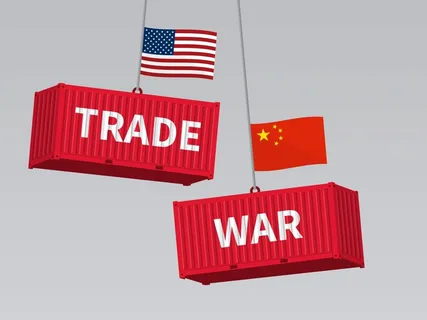US-China trade war turns dramatic as both economic titans agree to substantially cut tariffs for a short 90-day period, marking a rare de-escalation of what has been one of the most disruptive global trade disputes in recent history. The decision, sealed after pivotal negotiations in Geneva, is being seen as a calculated effort to calm markets, mend supply chains, and cool diplomatic tensions.
This unexpected turn in the US-China trade war has lifted global markets and provided an opportunity for fresh talks. The US-China trade war, which started on an assertive note of tariff increases, has not only strained bilateral ties but also shaken industries on continents. With this action, the US and China are attempting to soothe the economic hurt and move towards a more constructive trade relationship. Yet uncertainty still hangs heavy as the US-China trade war still lingers over unresolved problems.
Companies all over the globe are praying this move will be the beginning of a more permanent end to the US-China trade war. But experts warn that the truce may be fleeting if deeper tensions are not solved. As the US-China trade war embarks on this new chapter, the world awaits a lasting solution. The US-China trade war has not only influenced the two superpowers but has also disturbed the roots of globalization. It will take time only to tell if this 90-day truce can transform the course of the US-China trade war.
Read More: US Tariffs Threaten Sony’s Profit Amid Market-Wide Setbacks
Tariff Rollback Kindles Market Confidence and Supply Chain Relief
International investors embraced the news with arms wide open, sending US and Asian markets rocketing after the tariff reduction announcement. For most businesses caught in the middle of the US-China trade war, this reversal is fresh air. US companies with significant reliance on Chinese imports are poised to benefit from lower costs, while Chinese exporters can now press goods into US markets with less hindrance.
While temporary, the reversal provides relief to sectors under strain by the protracted US-China trade war. Analysts opine that although the 90 days are transitory, they could be the foundation of more long-lasting trade collaboration. However, companies are encouraged to be vigilant because the US-China trade war is volatile and prone to making a comeback.
Political Rhetoric Behind the Truce
While traders rejoice, political rhetoric is still fierce. US President Donald Trump welcomed the agreement as a major victory, presenting it as evidence of American greatness and strategy. He asserted that it could pave the way for American businesses to gain more access in the Chinese market—something Beijing has long fought against.
On the Chinese side, authorities presented the reduction in tariffs as a means of stabilizing world trade, reiterating their resistance to protectionism. In spite of this flash of consensus, tensions between the US-China trade war are still evident in ongoing disagreements on sensitive topics like fentanyl manufacturing and intellectual property. These political cleavages remind us that the US-China trade war, while tempered, has a long way to go.
Strategic and Economic Implications of the Tariff Cut
The tariff cut is viewed as a reciprocal effort to contain more economic harm. The US-China trade war had already caused substantial export losses, manufacturing output, and employment in main sectors. As the US economy recorded its first quarterly contraction since 2022 and China’s manufacturing sector facing strain, the timing of the rollback is particularly important. Still, analysts note that structural issues still exist and that the US-China trade war could still make a comeback if underlying issues aren’t resolved. Market access, transfers of technology, and transparency of regulations remain pending. While this step gives short-term advantage to diplomacy, wounds of the US-China trade war remain recent and deep.
What Lies Ahead?
As the 90-day clock starts ticking, the world will be observing how both countries enter into more intense negotiations. There is guarded optimism that this ceasefire may result in more permanent solutions, but history has proven that the US-China trade war has been far from predictable. For the time being, companies can breathe a little easier, but they need to remain vigilant as geopolitical tensions continue to mold the global economic landscape.
For More Trending Business News, Follow Us 10xtimes News






